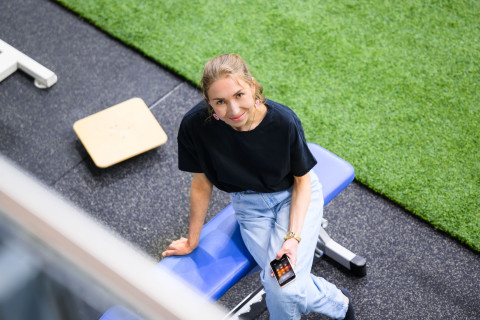A wellness-oriented lifestyle finds fascinating yet contradictory manifestations on social media.
- Text Nina Venhe | Photos Niko Jouhkimainen and Mostphotos
“At its best, wellness content on social media can bring joy, inspiration and motivation. But at its worst, it gets under your skin and stirs feelings of inadequacy,” Doctoral Researcher Reetta Haverinen says, describing the contradictory nature of her research topic.
Authored in the field of gender and cultural studies, Haverinen’s doctoral dissertation examines the wellness culture on social media. Wellness refers to a trendy and well-being-focused lifestyle seeking to promote individual well-being. According to Haverinen, it strives for health, well-being and an optimal version of oneself. The wellness lifestyle can be signalled to others through specific clothing, diet and routines, for example.
And what better place to showcase such a lifestyle than social media?
“As a visual and aesthetic platform, Instagram in particular is well-suited for wellness content. This type of content is often produced by financially well-off women who meet Western beauty and fitness ideals and could be described as embodiments of the wellness lifestyle,” Haverinen says.
Optimal life through self-discipline and life management
Wellness content aimed at women often stems from the idea of women always being insufficient, incomplete and in need of modification – either physically, mentally, or both.
“Wellness content on social media makes a promise of an optimal life being possible for everyone through self-discipline, life management and certain transformations. These promises appeal to women.”
Haverinen is currently writing her doctoral dissertation on how the female audience is addressed on Instagram, and what kind of aspects are associated with women’s self-care.
“My data consist of Instagram posts by seven Finnish female wellness influencers, and my approach is that of feminist media studies.”
With her research, Haverinen seeks to enrich our understanding of the challenges and opportunities of wellness, and their effects on both individual and societal levels.
“My research also increases our understanding of the importance of critical media literacy in today’s society, where social media is a significant source of information and an environment that shapes people’s actions and thoughts.”

A self-perpetuating vicious circle
Besides causing contradictory emotions among users, content creators, too, operate under conflicting pressures.
“Wellness offers experiences and, in many ways, responds to the demands of individual well-being that are typical of our time. For women, it holds a promise of an empowered self that can be achieved through persistent efforts.”
At the same time, however, it can deepen well-being disparities, as the opportunities for an optimal life associated with wellness are not accessible to everyone – not economically, physically, mentally or socially.
“While women get inspired by content that suggests certain changes for better life management, this type of content also causes anxiety and feelings of inadequacy.”
And these are the very emotions that get consumers hooked on wellness tips, health technologies and products and services promising a good life.
“This ends up in a self-perpetuating cycle where the work for better well-being and ‘a new and improved me’ never ends.”
This ends up in a self-perpetuating cycle where the work for better well-being and ‘a new and improved me’ never ends.
Reetta Haverinen
Doctoral Researcher
Research helps understand social media
Social media is a ruthless environment, and this is something Haverinen knows from her own experience. She has previously been a lifestyle content creator as well as a heavy consumer of lifestyle content.
“That is one reason why I wanted to address this topic in my research. My own experiences of how various media content could cause pressures for a young person were distressing. I tried to live my life according to someone else’s standards, and I was feeling quite unwell as a young adult. Feelings of inadequacy were present every day.”
Since then, Haverinen says she has understood that there is no single right way to live. But the path to this realisation has been long, and she still sometimes feels conflicted, and her emotions go up and down while browsing social media.
“However, I think I’ve already taken some distance to this issue. Studying and doing research on the topic have helped, as have critical media literacy and understanding the logic that drives social media and its contents.”
And this is what she would like to share with a wider audience through her research.
“Of course, I am most concerned about young people who may not yet have the skills or ability to understand all the factors that influence the content we see on social media and the invisible rules that guide content creators’ work.”

Content creators’ tightrope walk
So, what are the factors that guide content creators’ work?
First, Haverinen highlights the business and earning logic of social media. Being an influencer and having visibility and reach on social media often require business collaborations, sponsor agreements and commodification of skills, that is, commercialising one’s passion and lifestyle.
“Moreover, Instagram as a platform is very aesthetic, and especially female influencers are quite limited in what they can publish as wellness influencers.”
Haverinen says her empathy for content creators has grown as her research has progressed.
“Female influencers have very little room for manoeuvre, and the content they create often has to meet certain terms. These terms are set by both business collaborators and the content-consuming audience.”
Content creation is like walking a tightrope, as it must please everyone and not annoy anyone. This is, of course, impossible, and there are always critics.
Is the super woman narrative becoming a thing of the past?
However, more and more content that breaks and deviates from this norm has begun to appear on social media.
“I have noticed a certain fatigue towards the ‘super woman narrative’.”
By this, Haverinen refers to the individualistic and neoliberal idea of everything depending solely on the individual, which has long prevailed also on social media, and is now being challenged.
“Media content dealing with women’s well-being has often been found to reproduce the post-feminist narrative, meaning that a woman must be able to do everything alone and excel in every aspect of life. The ideal in that narrative is a beautiful woman who feels well and independently paves her way to success.”
This narrative typically portrays a woman who may have been unwell or exhausted but has since managed to build a successful life after overcoming her challenges and becoming empowered.
“My interpretation is that millennials have grown tired of that narrative. My data suggest that instead of heroic survival stories, people also have the courage to admit that exhaustion and difficulties do not always make them stronger but leave a long-lasting mark. And still, life can be good.”
Perhaps, you no longer need to be an ever-evolving best version of yourself. Haverinen hopes and believes that performance orientation and the neoliberal conception of humanity will increasingly be replaced by an idea of incompleteness being inherently human, and of individuals developing through their connections to other people, nature and society.
“Signs of people realising that not everything is up to them alone can, in my view, be seen in my data. For instance, the importance of being connected to nature is acknowledged. It is delightful and refreshing to encounter content that does not revolve around the individual and conveys a message of it being perfectly fine to be incomplete and vulnerable.”
Responsibility lies with consumers, too
Haverinen’s research offers many different perspectives to explore and expand. As a general remark, she points out that social media platforms are diverse, with consumers also having responsibility for their reactions and behaviour.
“Content creators cannot be categorically blamed whenever someone is having feelings of anxiety. It would be beneficial for everyone to develop their self-knowledge, making it easier to use social media in a way that supports their well-being. In addition, by cultivating media literacy, it is easier to be exposed to various types of content.”
However, social media can offer something for everyone, and it is not an inherently bad place.
“When you find channels that support your well-being and understand the principles of how social media works, these platforms can, in a best-case scenario, be a source of peer support, new friends, information and entertainment.”
For further information, please contact:
Doctoral Researcher Reetta Haverinen, [email protected]


